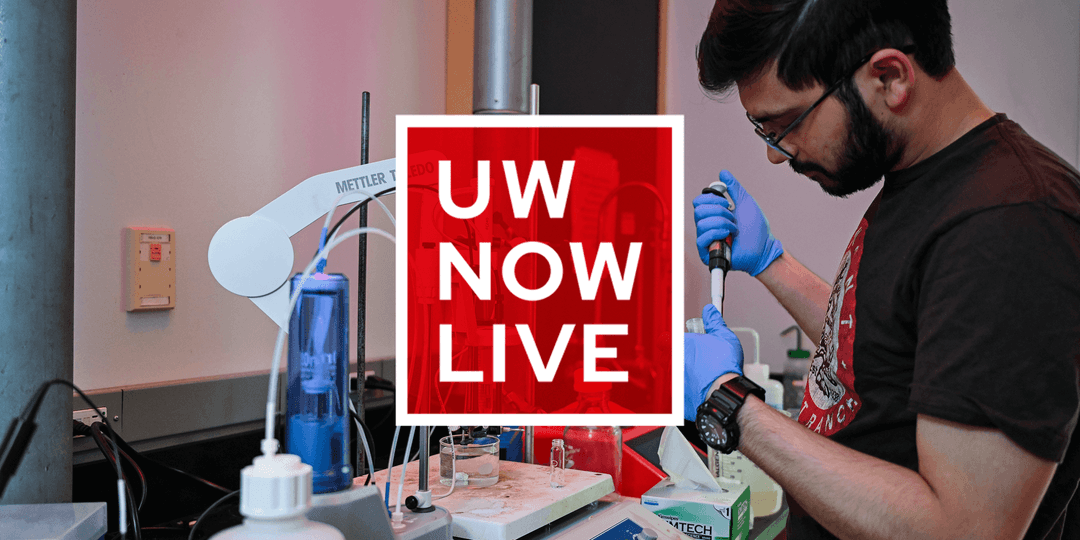Steve Ackerman and Jon Martin can’t stop talking about the weather. In fact, they think more people should start. As the self-proclaimed Weather Guys, Ackerman and Martin use their meteorological expertise to teach the public about the forces of nature that shape their daily lives. Unfortunately, humans are shaping the weather, too, and not for the better. On this evening’s episode of The UW Now Livestream, Martin, a professor in the UW Department of Atmospheric and Oceanic Sciences, and Ackerman, the recently retired vice chancellor of research and graduate education, will share examples of weather events and patterns that give evidence of a rapidly warming planet and the pervasive impact climate change will continue to have should we wait any longer to intervene.
Our Main Areas of Expertise Are:
Ackerman: My area of expertise is atmospheric radiation and the energy budget of the planet, which is a large aspect of what drives our climate — global climate and regional climate — to some degree. [I’m also an expert] in satellite meteorology, so observing Earth from satellites. As I like to frequently say, Wisconsin is the birthplace of weather satellites. It all began at UW–Madison, and I’m happy to be part of that history.
Martin: I think a lot about the structure, the dynamics and the precipitation distribution that’s associated with midlatitude cyclones, the kind of storms that come by us mostly during the cold season, and also the connection of those storms to the climate system. I’ve learned a little bit in recent years about signals that tell us something about what’s going on with the climate that can be discerned by thinking about the nature and behavior of midlatitude weather systems.
On The UW Now Livestream, We’ll Discuss:
Ackerman: I’ll be talking about the basics of what climate is and the things that force climate and climate change, and then looking at some maps for Wisconsin of how the climate has changed in terms of temperature and total precipitation in a season. Those are things that people may think that they have observed, and by that I mean, when you start looking over decades of how temperature has changed or how snowfall amount has changed, sometimes we get biased by a particular year that we as individuals experienced. Really, you need to look at the data over a long time period to see what’s really going on because there are a lot of year-to-year fluctuations.
Martin: I’m going to be talking about some of the irrefutable evidence that leads to the conclusion that the planet is warming and that the climate is changing. One particular piece of evidence that is the temperature of the air at about a mile above sea level. I’ve done some analysis that I stumbled into that I call the 850 millibar cold pool analysis. It turns out that during the wintertime, the aerial extent of this cold pool that envelops the northern hemisphere has systematically been shrinking, and there is no other way to explain that shrinkage than to say that the atmosphere composition has changed in such a way as to erode a little bit of the warm edge of that cold pool as the years have gone by. That’s in direct support of the increase in carbon dioxide fraction in the atmosphere over the same period of time. It’s one piece of quite irrefutable evidence that the climate is changing, and even in the depths of winter you can see that evidence.
One Thing We’d Like Viewers to Remember Is:
Ackerman: As meteorologists, we know this is happening, and now it’s not just us and the data that’s pointing to it, but the insurance companies are changing what they do based on where people live and what the change in the climate is doing to that area in terms of insurance rates. I’m hoping that people come away with the understanding of that coupling between the meteorology and the insurance — and that’s just one industry that’s being impacted by climate change.
Martin: The questions of whether or not climate is changing and whether or not human beings bear responsibility for it are conclusively decided, and the answer is an urgent and emphatic yes. What we need to do now is find ways to work together, both at home and abroad, to actually implement solutions to the problem, and I don’t think we should waste any more time or energy on arguing about whether or not there is a problem.
To Get Smart Fast, Read:
Ackerman: We’re revitalizing the Wisconsin State Climatology Office, and they have a resource that people can reach out to with their questions. Jon and I [also] write a weekly column in the local Madison paper, and we’re on Larry Meiller’s show every last Monday of the month. We’re always happy to take questions, hear people’s thoughts and what their observations are, and share what our interpretation and thoughts are on that.
Martin: The Intergovernmental Panel on Climate Change, the IPCC, just put out its sixth report, and the summary report for policy makers has an even shorter, more concise summary of the conclusions of the study. People could use that as a really good guide for what’s the actual current state of knowledge about what we think is going on with the climate system, and it’s written in good language for the person who is just interested but not particularly expert.



